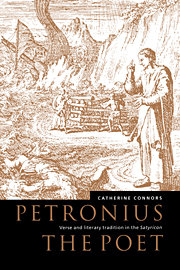Book contents
- Frontmatter
- Contents
- Prefatory note
- Acknowledgements
- List of abbreviations
- Introduction
- 1 Refashioning the epic past
- 2 In the frame: context and continuity in the short poems
- 3 Troy retaken: repetition and re-enactment in the Troiae Halosis
- 4 The Bellum Civile
- Epilogue
- Bibliography
- Index of passages discussed
- Index of subjects
2 - In the frame: context and continuity in the short poems
Published online by Cambridge University Press: 28 October 2009
- Frontmatter
- Contents
- Prefatory note
- Acknowledgements
- List of abbreviations
- Introduction
- 1 Refashioning the epic past
- 2 In the frame: context and continuity in the short poems
- 3 Troy retaken: repetition and re-enactment in the Troiae Halosis
- 4 The Bellum Civile
- Epilogue
- Bibliography
- Index of passages discussed
- Index of subjects
Summary
As everyone will agree, the short poems on moralizing or erotic themes performed by Trimalchio, and Eumolpus, and Encolpius (both as character and as narrator) represent utterly conventional habits of thought. In this they differ from the Satyricon's epic parody, which is aimed quite precisely at fragmenting and reshaping particular models. The short verses pause to reflect on the narrative, rather than carry it forward, and their universalizing assertions about love, luck or money can seem oddly trivial distractions or interruptions, clashing sharply with the messy details of the world inhabited by the characters. The short poems use conventional topics and forms to distill the details of the plot into timeless truths – and over and over Petronius constructs a plot that fights back, resisting the constraints of verse at every turn. Consequently, the poems are most often viewed in a disjunctive way. They are judged eligible for medieval anthologizing, or discussed as opportunistic displays of literary skill for its own sake, incongruous in the mouths of the characters who perform them, as signs that “stylistic disorder mirrors world disorder,” or, in Bakhtinian terms, as evidence of a multiplicity of stylistic levels, destabilizing the generic boundaries of established and authoritative literary forms. Yet an exclusive emphasis on the disjunctive qualities can be misleading; a close-up view of these poems “in the frame” will demonstrate some of the pointed and precise connections which Petronius contrives between the performances of his poets and the narrative of the novel.
- Type
- Chapter
- Information
- Petronius the PoetVerse and Literary Tradition in the Satyricon, pp. 50 - 83Publisher: Cambridge University PressPrint publication year: 1998



